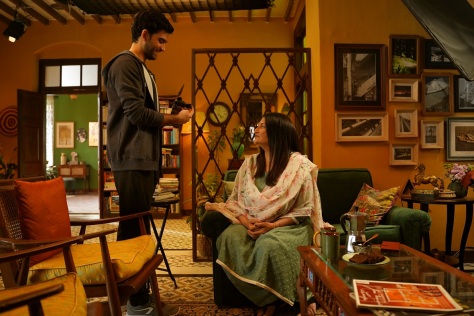STORY
Lifelong friends Amit, Om, and Javed decide to take a trek to the Everest Base Camp when their close friend Bhupen passes away.
INTRODUCTION
Uunchai is an emotional drama and a journey towards a mark where travelers seek the meaning of life. Four old friends visibly in their late 60s and 70s meeting, parting, singing, dancing, and enjoying whatever is left in their life. Uunchai is about a burning desire that one has longed to fulfill for ages. Uunchai is about learning and tolerating from a generational gap. Uunchai is about holding hands, bringing back memories, and hugs. Uunchai is about climbing. Uunchai is about lost love.
REVIEW

The biggest plus of the film is the story. To my heavy surprise, Bollywood is very limited in basing its films on friendships. And here, Uunchai talks about old-age friendships. The audience deserves to get attention through thoughtful plots.
Another plus is the ensemble casting of senior actors. The friendship quartet was Amitabh Bachchan, Anupam Kher, Boman Irani, and Danny Denzongpa. The female leads were Neena Gupta and Sarika; and Nafisa Ali in a cameo. Parineeti Chopra played an important supporting role.
I refuse to believe that the film is directed by Sooraj R. Barjatya. His filmmaking aesthetics for Uunchai are completely different from what he presented to the audience in his previous films. Maybe someone else directed Uunchai under his name or maybe he has learned with time that if he has to survive and make successful films amongst the current crop of excellent directors, then he has to change the directional techniques. I say this because Bollywood history is full of disappointing comebacks.
With such an impressive plot and fabulous casting, Uunchai could have been one of the best films of 2022. But one negative factor declined this film from achieving that purpose – length! This film is almost a three-hour film. So what to blame when the length becomes the issue? Indeed, screenwriting! It was a simple plot but the screenplay was massively stretched on the journey to Everest and then on the climbing.
Technically, stretching on the climbing was acceptable because trekking to Mount Everest for their friend was actually the core of the story. It is their journey in the middle portion of the film that bought a lot of time. Lying to Javed’s wife, then taking her on the journey to be dropped at the daughter’s house. When things do not work then consider meeting Om’s family and then drop her. And then another arc of taking a lady during the journey who turns out to be Bhupen’s lost love, Mala.
To my calculation, all these developments took 50 minutes of the film. Not saying that Sooraj Barjatya should have avoided all this but he could have shortened this journey length. Let’s say 20 minutes instead of 50 and a few more minutes from the whole climbing part of the film. And then the film picturized a lot of songs. The film at stretch could have been a 120-minute film, absolutely not 170.
The second half had a lot of plotholes and raised a lot of questions. Why would the local villagers cross the bridge when they observe that the climbers are already struggling to cross it? How did the tour guide allow Amit to continue the journey after knowing what he suffers from? Amit is given oxygen when he collapses again. I was wondering, why was he not using it while trying to reach it in the first place.
UUNCHAI MUST HAVE BEEN NON-LINEAR
I think Uunchai should have been a non-linear film. The reason is that Sooraj Barjatya was firm to stretch on the friendship but the problem is that Bhupen’s character died within half an hour. So there was no growth in such a friendship quartet and at the time of Bhupen’s death, the real impact of sentiments fall flat. It would have been an extraordinary direction of film running with two different timelines concluding over Bhupen’s death in one parallel and throwing his ashes on the base camp in the other parallel.
CLOSING REMARKS

Uunchai sustains Rajshri Productions‘ long hold on traditional and culturally influenced family values. Here, the film focused more on friendship. I think this film is for all ages and in the development of the continuity, it emotionally relates to us somehow. You can absolutely watch this along with your family.
In a world full of stories and incidents, things with you happen for a reason. Bhupen bought the tickets for trekking but died. His friends paid their final respect and went on an emotional and spiritual journey. And during this journey, until reaching that mark, they came across a lot of things in life that taught them a lot. Had Bhupen not died perhaps Amit would never happen to speak to his wife, Om would never consider a change in business nor would he ever realized how many grudges his relatives were holding for him, Javed and his wife would have never understood their daughter’s domestic situation, Amit would have never understood the value of his books, Mala would never get the second chance, and last of all Bhupen’s friends would have never realized his obsession with Mount Everest and the girl he loved the most.
So, friends, things happen for a reason.
RATINGS: 7/10
SUBSCRIBE TO MY YOUTUBE CHANNEL AND WATCH MY FILM REVIEW HERE
FOLLOW ‘THE DARK KNAIK’ ON OTHER SOCIAL PLATFORMS
TIKTOK https://www.tiktok.com/@thedarkknaik
FACEBOOK https://www.facebook.com/thedarkknaik
INSTAGRAM https://www.instagram.com/thedarkknaik/











